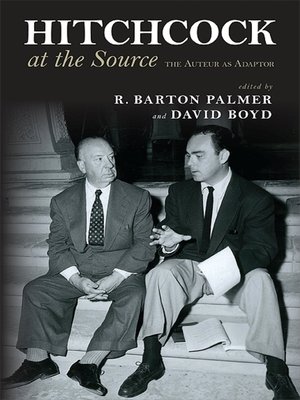Hitchcock at the Source
ebook ∣ The Auteur as Adapter · SUNY Series, Horizons of Cinema
By R. Barton Palmer

Sign up to save your library
With an OverDrive account, you can save your favorite libraries for at-a-glance information about availability. Find out more about OverDrive accounts.
Find this title in Libby, the library reading app by OverDrive.



Search for a digital library with this title
Title found at these libraries:
| Loading... |
The adaptation of literary works to the screen has been the subject of increasing, and increasingly sophisticated, critical and scholarly attention in recent years, but most studies of the subject have continued to privilege literature over film by taking the literary sources as their starting point. Rather than examining the processes by which a particular author has been adapted into a diversity of films by different filmmakers, the contributors in Hitchcock at the Source consider the processes by which a varied range of literary sources have been transformed by one filmmaker into an impressive body of work.
Throughout his career, Alfred Hitchcock transformed a variety of literary sources—novels, plays, short stories—into what is arguably the most coherent and distinctive (narratively, stylistically, and thematically) of all directorial oeuvres. After an introduction surveying the nature and diversity of Hitchcock's sources and locating the current volume in the context of theoretical work on adaptation, nineteen original essays range across the entirety of Hitchcock's career, from the silent period through to the 1970s. In addition to addressing the process of adaptation in particular films in terms of plot and character, the contributors also consider less obvious matters of tone, technique, and ideology; Hitchcock's manipulation of the conventions of literary and dramatic genres such as spy fiction and romantic comedy; and more general problems, such as Hitchcock's shift from plays to novels as his major sources in the course of the 1930s.
Throughout his career, Alfred Hitchcock transformed a variety of literary sources—novels, plays, short stories—into what is arguably the most coherent and distinctive (narratively, stylistically, and thematically) of all directorial oeuvres. After an introduction surveying the nature and diversity of Hitchcock's sources and locating the current volume in the context of theoretical work on adaptation, nineteen original essays range across the entirety of Hitchcock's career, from the silent period through to the 1970s. In addition to addressing the process of adaptation in particular films in terms of plot and character, the contributors also consider less obvious matters of tone, technique, and ideology; Hitchcock's manipulation of the conventions of literary and dramatic genres such as spy fiction and romantic comedy; and more general problems, such as Hitchcock's shift from plays to novels as his major sources in the course of the 1930s.






